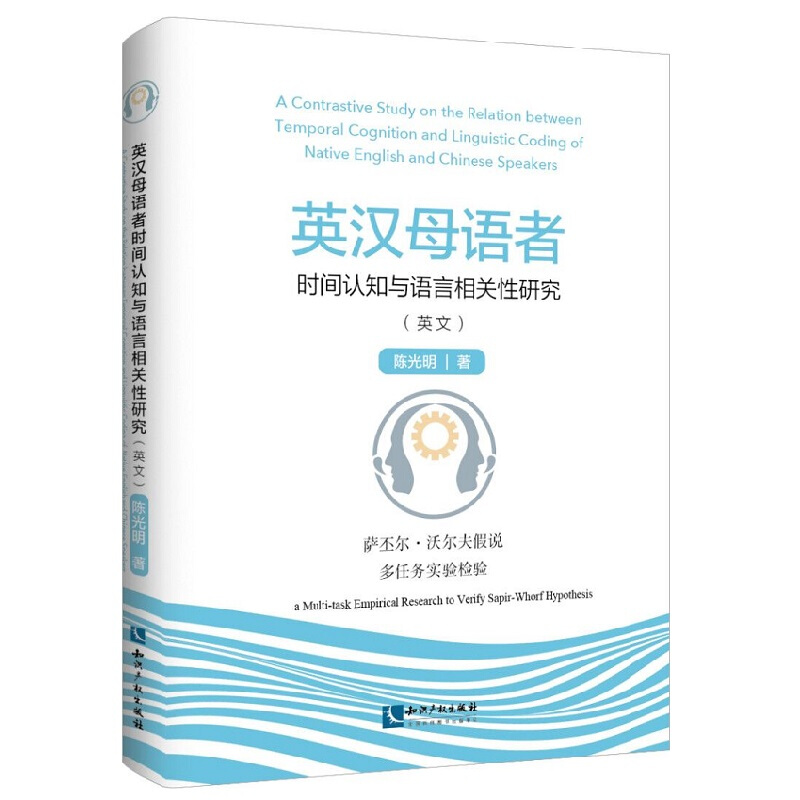
英汉母语者时间认知与语言相关性研究:萨丕尔.沃尔夫假说多任务实验检验(英文)
1星价
¥58.5
(7.5折)
2星价¥58.5
定价¥78.0

图文详情
- ISBN:9787513071154
- 装帧:一般胶版纸
- 册数:暂无
- 重量:暂无
- 开本:其他
- 页数:320
- 出版时间:2020-11-01
- 条形码:9787513071154 ; 978-7-5130-7115-4
内容简介
萨丕尔·沃尔夫假说是一个关于语言、文化和思维之间关系的假说。该假说中所蕴含的理念是对启蒙主义时期“语言—思维”观(思维与语言是两个不同过程,且前者接近制约后者)的反拔。本书采用新沃尔夫主义者的研究范式,以英汉母语者为实验对象,在时间领域对该假说进行了检验。实验结果表明:两组被试的时间认知既有共性,也存在显著差异;已有时间认知模型对英汉母语者时间认知图式的描述存在偏差;人类时间认知的形成基于一个复杂的经验基础网络,作为这个网络的组成部分,语言因素确会影响人脑中时间表征的形成。本书可作为认知语言学实证研究领域的参考用书。
目录
Contents
Chapter 1.Introduction: what is SWH .........................................................................1
1.1 A brief history of SWH..........................................................................3
1.2 Different terms used to address SWH .................................................13
1.3 Different interpretations of SWH ........................................................19
1.4 Misusage .............................................................................................23
1.5 Key terms in SWH ..............................................................................26
1.6 Summary: What is SWH .....................................................................32
Chapter 2 Literature review of empirical studies on SWH ....................................33
2.1 Literature review on empirical studies in the neo-Whorfian period
(articles presented in English) .............................................................38
2.2 Literature review on empirical studies in the neo-Whorfian period
(articles presented in Chinese) ............................................................98
2.3 Summary ...........................................................................................101
Chapter 3 Research methodology: the neo-Whorfian research paradigm .......103
3.1 Picking a domain: the domain of time .............................................104
3.2 Linguistic coding of time in Chinese and English ............................109
3.3 Non-linguistic coding of time in the cognition of native speakers of
Chinese and English: temporal representations in cognition ............120
3.4 Summary ..........................................................................................136
Chapter 4 Do native Chinese and English speakers think about time
differently because they talk about time differently ..........................137
4.1 Experiment 1: time in spontaneous gestures .....................................139
4.2 Experiment 2: time in deliberate gestures .........................................171
4.3 Experiment 3: the STARC effect .......................................................215
Chapter 5 Conclusion ................................................................................................238
5.1 Answers to the research questions .....................................................238
5.2 Weaknesses of the present research ..................................................243
References .......................................................................................................................245
Appendixes.....................................................................................................................269
Appendix 1: spontaneous gestures of native Chinese speakers
(presented in interview order) ....................................................................270
Appendix 2: spontaneous gestures of native English speakers
(presented in interview order) ....................................................................285
Appendix 3: questions for native Chinese speakers in Experiment 2 ........307
Appendix 4: questions for native English speakers in Experiment 2 .........308
Chapter 1.Introduction: what is SWH .........................................................................1
1.1 A brief history of SWH..........................................................................3
1.2 Different terms used to address SWH .................................................13
1.3 Different interpretations of SWH ........................................................19
1.4 Misusage .............................................................................................23
1.5 Key terms in SWH ..............................................................................26
1.6 Summary: What is SWH .....................................................................32
Chapter 2 Literature review of empirical studies on SWH ....................................33
2.1 Literature review on empirical studies in the neo-Whorfian period
(articles presented in English) .............................................................38
2.2 Literature review on empirical studies in the neo-Whorfian period
(articles presented in Chinese) ............................................................98
2.3 Summary ...........................................................................................101
Chapter 3 Research methodology: the neo-Whorfian research paradigm .......103
3.1 Picking a domain: the domain of time .............................................104
3.2 Linguistic coding of time in Chinese and English ............................109
3.3 Non-linguistic coding of time in the cognition of native speakers of
Chinese and English: temporal representations in cognition ............120
3.4 Summary ..........................................................................................136
Chapter 4 Do native Chinese and English speakers think about time
differently because they talk about time differently ..........................137
4.1 Experiment 1: time in spontaneous gestures .....................................139
4.2 Experiment 2: time in deliberate gestures .........................................171
4.3 Experiment 3: the STARC effect .......................................................215
Chapter 5 Conclusion ................................................................................................238
5.1 Answers to the research questions .....................................................238
5.2 Weaknesses of the present research ..................................................243
References .......................................................................................................................245
Appendixes.....................................................................................................................269
Appendix 1: spontaneous gestures of native Chinese speakers
(presented in interview order) ....................................................................270
Appendix 2: spontaneous gestures of native English speakers
(presented in interview order) ....................................................................285
Appendix 3: questions for native Chinese speakers in Experiment 2 ........307
Appendix 4: questions for native English speakers in Experiment 2 .........308
展开全部
作者简介
陈光明,女,博士研究生,讲师。北京语言大学英语语言文学博士毕业,现任职北京语言大学外国语学部英语学院,主要从事语言与文化对比研究。主持并完成多个北京语言大学院、校级项目,主持教育部青年项目,在《语言教学与研究》等杂志发表文章。
本类五星书
本类畅销
-

THE LITTLE PRINCE-小王子
¥5.3¥19.8 -

了不起的盖茨比(纯英文)/床头灯英语.3000词读物
¥4.5¥12.8 -

地心游记(纯英文)/床头灯英语.3000词读物
¥5.4¥15.8 -

安徒生童话精选
¥13.6¥40.0 -

茶花女
¥4.0¥12.0 -

小妇人(纯英文)/床头灯英语.3000词读物
¥7.6¥15.8 -

考研英语背单词20个词根词缀
¥1.4¥3.2 -

呼啸山庄-英语原著版
¥6.8¥18.0 -

MADAME BOVARY-包法利夫人
¥9.9¥36.8 -

名著名译英汉对照读本马克.吐温短篇小说选
¥9.5¥28.0 -

命案目睹记
¥14.2¥33.8 -

理想丈夫
¥10.1¥28.0 -

THE GREAT GATSBY-了不起的盖茨比
¥5.5¥16.8 -

恋爱中的女人-中译经典文库-世界文学名著-第五辑
¥9.3¥29.0 -

夏洛的网(平装双语版)//2023新定价
¥36.0¥58.0 -

鲁滨孙漂流记
¥20.6¥48.0 -

哈利.波特与魔法石(英汉对照版)
¥38.0¥55.0 -

自然与社会-读懂汉字
¥26.9¥96.0 -

嘉莉妺妺-(英语原著版.第六辑)
¥7.8¥26.0 -

巴黎圣母院
¥5.4¥15.5












